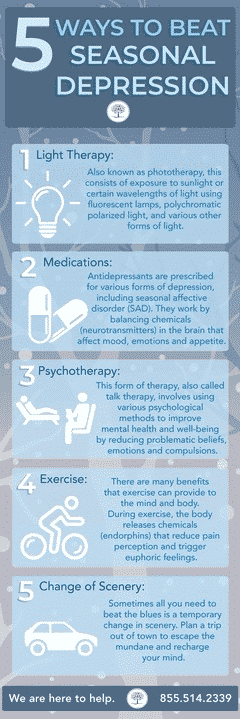There are various professional treatment options and at-home remedies that can help with seasonal depression. Learn 5 helpful tips.
With the holidays behind us and a new year ahead, this is “the most wonderful time of the year” for some, but not everyone can echo the sentiment. Maybe you’re more of the “winter blues” type. If so, you’re not alone. The changing temperatures leave thousands of people with seasonal depression, also known asseasonal affective disorder (SAD). This disorder is believed to be caused by a hormonal imbalance triggered by the shorter days of winter. SAD most commonly occurs in the late fall and early winter months, but it can occur in the warmer months as well. As a disorder that typically manifests itself annually, SAD symptoms usually begin and end around the same time every year, taking a toll on thoughts, mood and behavior.
There are various professional treatment options and at-home remedies (depending on the severity of the depression) that can help with SAD. Here are 5 helpful tips for beating seasonal depression.

1. Light Therapy
Also known as phototherapy, this consists of exposure to sunlight or certain wavelengths of light using fluorescent lamps, polychromatic polarized light, and various other forms of light. The correlation between light and mood has been studied by hundreds of researchers over the years. According to astudyconductedby the Baker Heart Research Institute in Melbourne, levels of serotonin (the “happy hormone” found naturally in the brain) are lower in the winter than in the summer. The only element that affected the moods of the participants in the study was the amount of daily sunlight exposure.
2. Medications
Antidepressantsare prescribed for various forms of depression, including SAD. They work by balancing chemicals (neurotransmitters) in the brain that affect mood, emotions and appetite. These medications are designed to reduce or eliminate symptoms of depression while also helping with sleep. “Antidepressants can help jumpstart mood and give people the boost they need to get over the symptoms of their depression,” says Eric Endlich, Ph.D., a clinical psychologist based in Boston. “This often allows them to start doing the things they enjoy again and make better choices for themselves, which also helps contribute to a more positive mood.
Treatment Can Be Life Changing. Reach out today.
Whether you are struggling with addiction, mental health or both, our expert team is here to guide you every step of the way. Don’t wait— reach out today to take the first step toward taking control of your life.
3. Psychotherapy
This form of therapy, also referred to as talk therapy, involves using various psychological methods to improve mental health and well-being. This is done by reducing problematic beliefs, emotions and compulsions, among other thoughts and behaviors.Cognitive-behavioral therapy (CBT)is one form of psychotherapy. This evidence-based psychosocial intervention focuses on developing coping strategies to improve mental health by eradicating unhealthy thoughts, beliefs and behaviors.
4. Change of Scenery
Sometimes all you need to beat the winter blues is time off and a temporary change in scenery, one that involves warmth and sunshine. Plan a trip down south for a week or just the weekend to catch some rays, escape the mundane, and recharge your body and mind. This can allow you to reap the benefits of light therapy and exercise while creating new memories. You may also want to consider permanently relocating (if possible) to a state that offers more days with temperatures in which you don’t experience SAD symptoms.
5. Exercise
There are many benefits that exercise can provide to the mind and body.During exercise, the body releases endorphins, which are chemicals that reduce pain perception and trigger euphoric feelings. With that in mind, making a daily effort to spend time exercising can improve your mood, not to mention your body and overall health. Aim for at least 30 minutes per session, if possible. You can run or take a brisk walk around your neighborhood or bike a few miles through the nearest trail.
If your seasonal depression is often associated with a substance use disorder,call The Recovery Villageto learn more about how a comprehensive treatment program can help. You can call 24 hours a day, seven days a week, to speak with someone who can give you the guidance you need or just offer a listening ear.






